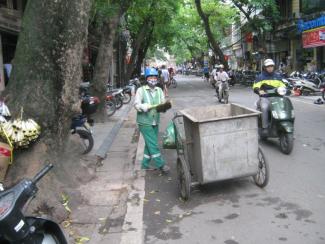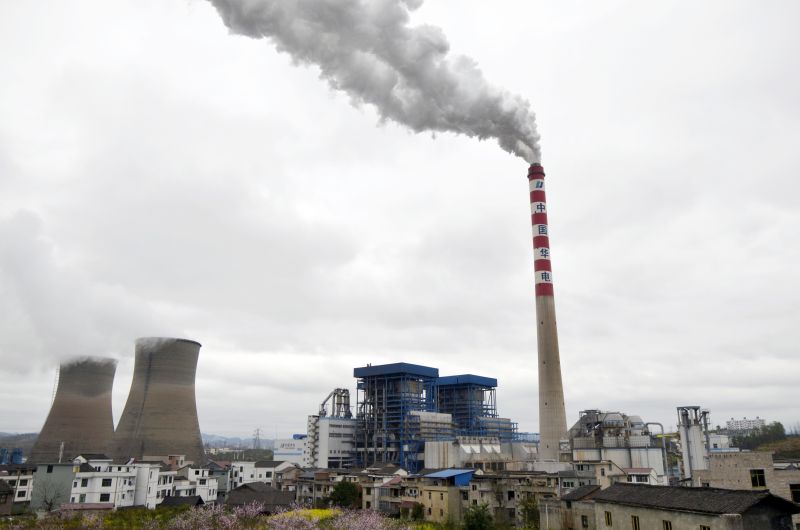Relevant reading
Local action, global purpose

Cities that do not manage waste well normally fail in other fields too, including health care, education and transport. This is what a World Bank publication of 2012 argues. Accordingly, it considers the modernisation of waste management one of the most effective approaches to improving municipal services in general.
Waste results from urbanisation and industrialisation. Garbage volumes, however, are rising faster than the rate of urbanisation, as the World Bank authors point out. This trend affects all world regions, but is particularly evident in China and other Asian countries. More waste generation, moreover, is said to go along with more emissions of climate gases and more water pollution. Given that more people are expected to live in cities by 2050 than inhabited the earth in 2000, garbage problems have global dimensions.
One of the World Bank’s important messages is that it is impossible to actually throw waste “away”, since it always ends up somewhere. Up-to-date waste management is about preventing waste as well as reusing and recycling. Landfills and incineration are technologically demanding and will lead to pollution and health risks if handled incompetently. They are only options for waste that can really not serve any other use anymore, the report states.
According to the World Bank experts, waste-collection systems tend to be inefficient in less developed countries even though waste collection normally is the biggest item in municipal budgets. Up to 60 % of garbage, the authors reckon, is not collected at all in the least developed countries, whereas the respective share is a mere two percent in advanced nations. In developing countries, moreover, the informal sector matters in garbage collection, with workers mostly not enjoying any kind of social protection. According to the study, the indirect costs of inadequate waste management normally exceed what an up-to-date service system would cost. The implicit good news, however, is that the patterns of how waste management develops tend to be similar, so policymakers can learn from experiences made in other places.
Long-term perspective
The UN Environment Programme (UNEP) argues along quite similar lines in a study of 2015. It points out that effective waste management is essential for the functioning of a society. Acute problems – such as infectious diseases due to poor waste management – require action. According to UNEP, the costs that arise due to the informal handling and neglect of waste are five to ten times higher per head than what it would take to run a well-regulated system.
Experience shows that waste-management systems develop incrementally over decades, the UNEP authors write. Once a problem becomes obvious, authorities can draft policies, enact laws and start building the necessary infrastructure. Waste only becomes a priority of national policymaking at a rather late stage of development, according to UNEP, but it nonetheless makes sense to consider long-term prospects when rising to acute challenges. The experience of other cities and nations often proves valuable in this context.
Generally speaking, effective waste- management systems depend on a coherent mix of direct regulation, economic incentives and awareness raising, the UNEP authors argue. They explain the three-pronged approach as follows:
- Laws and official regulations are needed to protect common goods such as the environment and public health. Laws and regulations define the basic approach, allocate responsibilities, set standards and spell out sanctions for non-compliance. Policymakers must act proactively. Moreover, strong institutions with sufficient authority are needed. In order to identify and punish infractions, good monitoring and data collection matter.
- Economic incentives help to guide the conduct of private households and businesses. For waste reduction, reuse and recycling to become attractive, waste generation must cost money. Therefore, it is wrong to fund landfills or incinerators from general taxation, whereas pay-as-you-throw (PAYT) systems are useful. Especially anyone who generates larger quantities of waste should bear the disposal costs. When donor agencies financially support the development and operation of waste systems, they must ensure sustainability and efficient cost-recovery once the project ends. Operation and maintenance costs can usually be covered with local fees, but funds from the national government or donor agencies may be needed to build and expand infrastructure.
- Finally, it is indispensable to raise general awareness and mobilise various interest groups. Information alone will not change behaviour. To get people to actually start sorting waste, one must understand their daily lives, take account of their interests and provide the necessary infrastructure. A lively exchange between people, politics and the state is essential.
In the eyes of UNEP, conceptual rigor and an understanding of local settings are both essential. No strategy will be effective without taking into account climate, culture, customs, the local waste composition and the local commodity demand. Technical expertise and funding matter too, of course. The cheapest option is often not the best option, UNEP warns.
Ultimately, waste governance is about responsibility being assumed, the study states. Defining legal and financial obligations is not enough. A good waste policy must evoke a sense of “ownership”, the authors insist, so the public becomes interested in the cleanliness of parks and public open spaces as well as in the environment and prudent resource use in general. Everyday street cleaning and garbage collection matter, but they are only starting points. Up-to-date waste governance deals with issues of production and consumption long before garbage collection even becomes necessary.
Floreana Miesen is a freelance author. She studies geography at Bonn University.
floreana.miesen@gmx.de
Hans Dembowski is editor in chief at D+C/E+Z.
euz.editor@fs-medien.de
Links
UNEP, 2015: Global Waste Management Outlook.
http://unep.org/ietc/ourwork/wastemanagement/GWMO
World Bank, 2012: What a waste – A global review of solid waste management.
http://documents.worldbank.org/curated/en/2012/03/20213522/waste-global-review-solid-waste-management
World Economic Forum, 2016: The new plastics economy.
http://www3.weforum.org/docs/WEF_The_New_Plastics_Economy.pdf













